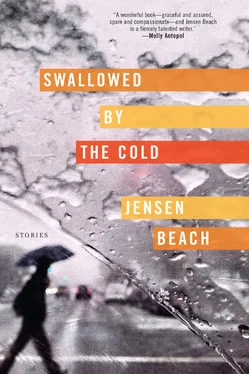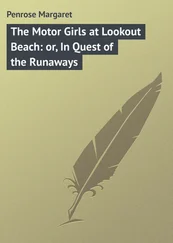Matthias reached under the net and pulled out the first bird. He spoke softly to it as he lifted it up, held it close to his chest. He turned the bird slowly in his hand and lifted each of its wings. Then he placed a blue plastic tag around the bird’s leg and crimped it shut with a pair of pliers. He and Anneke took turns removing a single bird at a time, made note of its tag if it had one, fastened their own tag on the bird’s leg, performed what Lennart guessed was a brief medical exam, and then released it. This they did by setting the bird down in the sand and waiting for it to fly away.
It took a long time to make it through all but one of the birds. “Twenty-seven,” Anneke said to Matthias, who was approaching the final bird. The bird wasn’t moving, and as Matthias got closer, he said something to Anneke that Lennart didn’t understand. Lennart watched them both to see how he should react. The bird was pinned beneath the pole, the net twisted and knotted around its neck. “It’s dead,” Anneke said without touching the bird to confirm that she was right.
Matthias lifted the net and untangled the bird. He held it in both hands, looking down at it for a moment, and walked to a stand of grass and placed the bird behind this. Lennart was surprised at how easy this all seemed, but he didn’t know what else he would have expected to happen. “That’s all?” he said.
“If this was another species of bird,” said Anneke, “or if we knew it was diseased, we would freeze the body to study it later. But plovers are common and this one appears healthy. What this bird will tell us about the plover population of Northern Europe is only that accidents sometimes happen.”
“Anyway” said Matthias, “we don’t have the proper equipment to freeze the bird.”
“Shouldn’t we bury it?” asked Lennart.
“No,” Anneke said. “An animal will find the bird and eat it. The rest will decompose. If you bury it in the sand, the bird will rot.”
“Shall we say a funeral prayer too?” Matthias said, laughing. “Light a candle?”
“Don’t listen to him. Unceremonious disposal of a dead body is not necessarily an indication of a lack of respect for these birds, or for nature. Animals die. This is normal in any ecosystem. We die, they die. It’s nothing.”
Lennart watched the Germans finish their work. They took down the blind and disassembled the net and the poles, neatly packing everything. Lennart helped as he felt he could, but mostly he just watched. He tried not to look at the dead bird.
He helped take equipment back to the car, following a short distance behind Anneke and Matthias, who seemed to have been energized by the success of the net and their work and spoke loudly about a restaurant they wanted to try in Skagen that evening. They were nearly back to the car when Lennart remembered the newspaper. He helped the Germans load the equipment in the trunk and the backseat, and then he went back for the paper.
He walked quickly down the trail, struggling to keep his pace in the sand. Up ahead he saw some birds, gulls maybe, circling above. He reached the place where they’d set up the blind and the net. Some larger birds had landed and were pecking at the plover’s carcass. When Lennart got close, the larger birds flew off. Anneke had said this would happen, of course, and he knew enough to know it was natural, but something about the tiny, bloodied body of the bird in the sand bothered him. He kicked some sand at it to cover the body, but this didn’t feel right either, so he took the paper and opened it and picked the carcass up and wrapped it in the paper as tightly as he could. He didn’t know what to do after this, so he opened his backpack and placed the bird carefully inside.
The Germans were waiting in the car when he got back. When he left the trail for the asphalt of the parking lot, he waved and began to jog, no more quickly than he could have walked probably, toward the car. Matthias put the car in gear and started driving before Lennart was settled. The door slammed with the momentum. He held his backpack on his lap. Anneke, her hand rested on Matthias’s shoulder, turned in her seat to look over her own shoulder at Lennart. “Did you find what you were looking for?”
He hadn’t said why he was going back. “I left my newspaper,” he said.
“What did you think of the Mile, Lennart?” Matthias asked.
The grasses and the waves of sand were pretty, a little boring, unsurprising, maybe. He’d liked watching the Germans work, though he still hadn’t decided whether Anneke had been joking about her and Matthias. The joke or whatever it was wasn’t particularly funny, but given that he didn’t know Anneke at all, it hardly seemed like an honest admission. He’d tried to imagine telling Marie about it, but there wasn’t really a way, as far as he could tell, to do so without seeming to betray an intimacy with Anneke that he hadn’t had. Marie would be curious about the context for such a story and he knew she’d have the same questions he did about the arrangement, whether it was true or not. “There were fewer people than I’d expected,” he said finally.
“We’re so far from everything up here,” Anneke said. “One might really do anything at all.”
On the drive back to the hotel, Matthias and Anneke talked more about the restaurant, which had been recommended to them. They were going to leave before lunch the next day. He looked at Anneke for a sign that she was disappointed about the end of the trip. She’d kept her hand on Matthias’s shoulder the whole drive, and when Matthias brought up the return trip, suggesting that they stop for the night in Hamburg on the way home, Anneke dropped her hand to his leg and looked away.
At the hotel, he helped the Germans take the equipment inside. He carried his backpack and a black plastic case about the size of his chest. He hadn’t remembered seeing the case at the Mile but assumed the Germans’ work required all kinds of equipment that he hadn’t seen in just one day spent with them. They gathered everything in the lobby, close to the elevators. Matthias went back to the car for the last of the things. It was late in the afternoon, and the sun, low on the horizon, shone in brightly through the tall windows. A nicely dressed couple came out of the bar and crossed the lobby. They walked slowly and deliberately around the equipment. Lennart heard the woman ask the man in a whisper, “Are they making a film, do you think?” The man looked at Lennart and shrugged. He passed very close and Lennart smelled the alcohol on his breath. The day he’d arrived, he’d bought two bottles of Japanese whiskey in Frederikshavn. The first bottle was already empty. He was looking forward to a drink when he got up to his room. When the couple had gone, Anneke leaned close to Lennart. She smelled like sweat but not unpleasantly so. “I know what you did,” she said.
“I’m sorry?” Lennart said. His face got warm and he looked past her.
“I’d only guessed it before,” she said. “But I can tell I was right by the way you’re acting. You did something with the plover, didn’t you?”
“I went back for the newspaper,” he said quietly. “Like I told you.”
“We can’t tell Matthias. I think it’s kind of funny, even a little sweet, but he’d be angry. Did you bury it? Is that what took so long?”
“Of course not.”
“What then?” she said. “You don’t have it with you.”
“Of course not,” he said again.
Anneke looked at his backpack and up at Lennart. “We know something about each other now,” she said.
Matthias came in holding the last of the gear. A bag was slipping from his shoulder.
“We were just talking about dinner,” Anneke said. “He isn’t going to join us after all.”
Читать дальше











